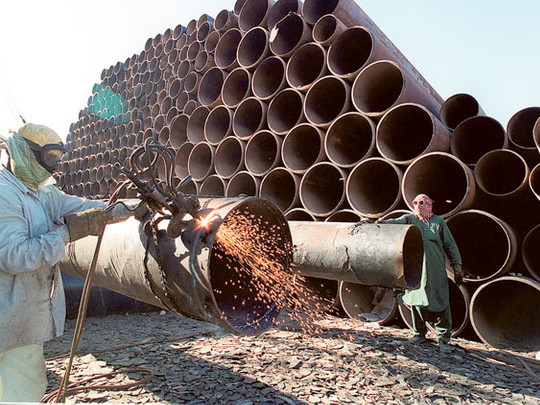
Abu Dhabi: Abdullah Sultan Al Fan Al Shamsi, Assistant Undersecretary for Industrial Affairs at the Ministry of Economy, affirmed that the Ministry of Economy (MoE) successfully terminated two countervailing investigations on UAE exports of steel pipes initiated by the Canadian Borders Services Agency (CBSA) on May 15 and the United States International Trade Commission (USITC) on November 15.
Al Shamsi confirmed that the CBSA, which is the Canadian investigating authority on subsidisation, issued on November 9 a negative final determination on subsidy in respect of UAE, and therefore terminated the subsidy investigation concerning UAE exports of steel pipes.
The termination of the investigation was on the basis of the arguments and evidences provided by the MoE in response to the CBSA requests for information and the verification visit that the CBSA investigators carried out at the MoE in September 2012.
These clearly demonstrated that the UAE Government is not providing any subsidy that might be not consistent with the Agreement on Subsidy and Countervailing Measures (ASCM).
As regards the US countervailing and antidumping investigations, Al Shamsi confirmed also that the USITC issued on November 14 its negative final determination regarding both investigations affirming that the US industry is not materially injured or threatened due to imports of steel pipes from inter alia UAE and consequently, no antidumping or countervailing duty duties will be imposed on UAE exports of the said product to the US market.
Al Shamsi clarified that the US proceedings regarding trade remedy investigations are based on the distribution of competences between two separate entities, which are the Department of Commerce and the USITC.
The Department of Commerce, empowered to investigate on subsidy and dumping practices, issued on October 16 an affirmative determination recommending the imposition of countervailing and antidumping duties on UAE exports of steel pipes.
The USITC is empowered to investigate on injury and causality between injury and imports, and based on the USITC’s negative determinations that imports are not causing or threatening to cause injury to the US producers, the investigations have been terminated.
As a result, all countervailing investigations that have been so far targeting the UAE exports of steel pipes are currently terminated.
Al Shamsi pointed out that the positive results reflect the efforts of the MoE under the guidance of Sultan Bin Saeed Al Mansouri, Minister of Economy, to achieve the strategic objectives of the MoE 2011-2013 for the “Development of the industrial sector reaching competitiveness” as well as the great attention shown by Mohammad Bin Abdul Aziz Al Shehi, Undersecretary of the MoE, on this subject with the goal of removing trade barriers for UAE exports.
Terminating the above investigations will at least maintain UAE`s exports market share which represented respectively 7 per cent and 14 per cent of US and Canada imports of steel pipes in 2011.
Al Shamsi appreciated the transparency of the proceedings and impartiality of the Canadian and US investigating authorities and indicated that the above determinations upheld the concept of free and fair international trade under the World Trade Organisation (WTO) principles.
The MoE has been defending these principles during its participation to the rules negotiations mandated under the Doha Ministerial Conference with respect to the ASCM and Agreement on Antidumping in order to confirm its position that trade remedy measures should not be used as disguised protectionism but instead investigating authorities must fully comply with the WTO procedural and substantive requirements and ensure a fair and transparent investigation.
In this respect, Al Shamsi noticed that several trade remedy measures are imposed against UAE which are not in conformity with the WTO requirements, and accordingly the MoE is studying all avenues to reverse such measures under the WTO proceedings, inter alia, the Dispute Settlement Mechanism.
Al Shamsi reiterated that the MoE would never have been able to achieve these results without the support and collaboration of various Federal and Local authorities that provided the MOE with the required data, especially Jafza, Zones Corp, Dewa, Fewa, Adwea, Dubai Customs, Abu Dhabi Customs as well as the Ministry of Foreign Trade and Ministry of Foreign Affairs represented by the UAE Embassies to Washington and Ottawa which played a key role in coordinating between the MoE and the investigating authorities.
This constructive and fruitful cooperation between the Federal and local authorities should be, Al Shamsi pointed out, a model to be followed in all other matters related to the interests of the UAE and enhancement of the spirit of the union.












